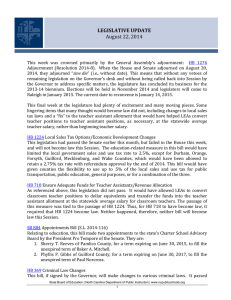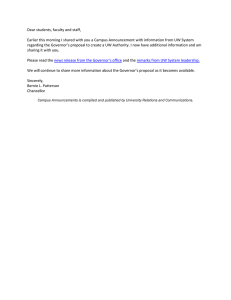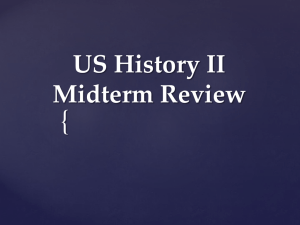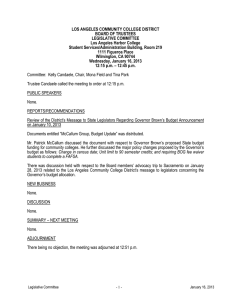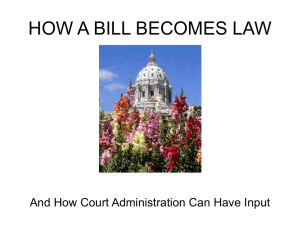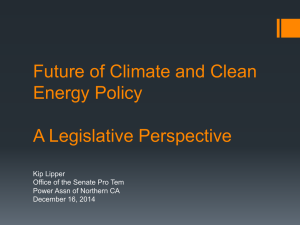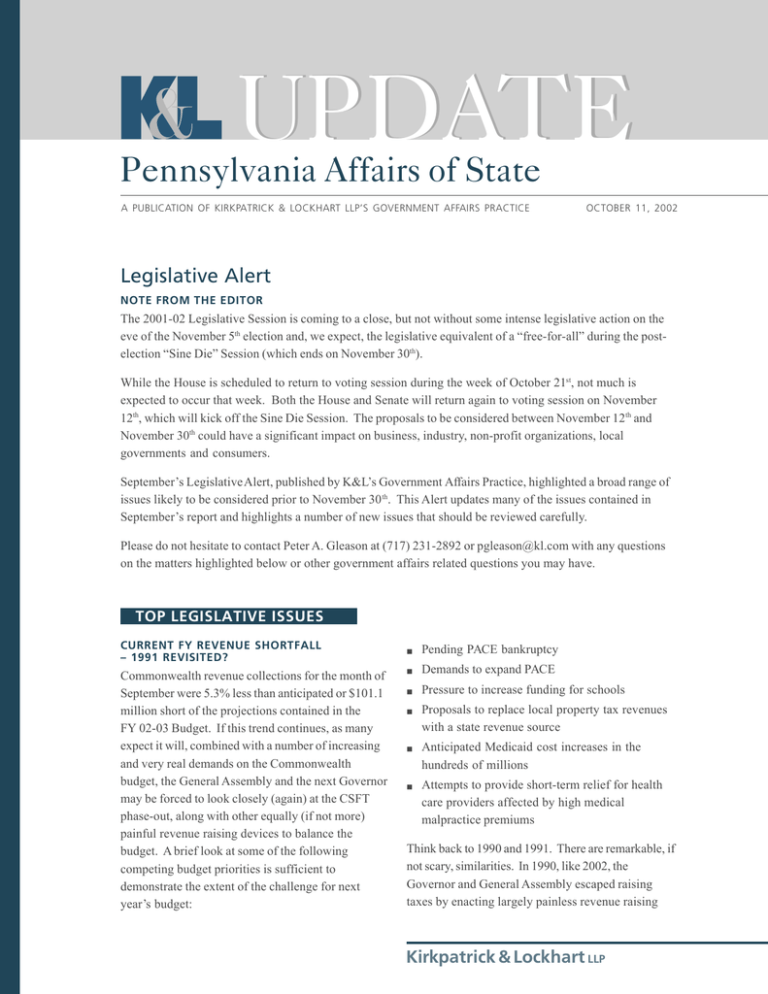
UPDATE
Pennsylvania Affairs of State
A PUBLICATION OF KIRKPATRICK & LOCKHART LLP’S GOVERNMENT AFFAIRS PRACTICE
OCTOBER 11, 2002
Legislative Alert
NOTE FROM THE EDITOR
The 2001-02 Legislative Session is coming to a close, but not without some intense legislative action on the
eve of the November 5th election and, we expect, the legislative equivalent of a “free-for-all” during the postelection “Sine Die” Session (which ends on November 30th).
While the House is scheduled to return to voting session during the week of October 21st, not much is
expected to occur that week. Both the House and Senate will return again to voting session on November
12th, which will kick off the Sine Die Session. The proposals to be considered between November 12th and
November 30th could have a significant impact on business, industry, non-profit organizations, local
governments and consumers.
September’s Legislative Alert, published by K&L’s Government Affairs Practice, highlighted a broad range of
issues likely to be considered prior to November 30 th. This Alert updates many of the issues contained in
September’s report and highlights a number of new issues that should be reviewed carefully.
Please do not hesitate to contact Peter A. Gleason at (717) 231-2892 or pgleason@kl.com with any questions
on the matters highlighted below or other government affairs related questions you may have.
TOP LEGISLATIVE ISSUES
CURRENT FY REVENUE SHORTFALL
– 1991 REVISITED?
Commonwealth revenue collections for the month of
September were 5.3% less than anticipated or $101.1
million short of the projections contained in the
FY 02-03 Budget. If this trend continues, as many
expect it will, combined with a number of increasing
and very real demands on the Commonwealth
budget, the General Assembly and the next Governor
may be forced to look closely (again) at the CSFT
phase-out, along with other equally (if not more)
painful revenue raising devices to balance the
budget. A brief look at some of the following
competing budget priorities is sufficient to
demonstrate the extent of the challenge for next
year’s budget:
■
Pending PACE bankruptcy
■
Demands to expand PACE
■
Pressure to increase funding for schools
■
■
■
Proposals to replace local property tax revenues
with a state revenue source
Anticipated Medicaid cost increases in the
hundreds of millions
Attempts to provide short-term relief for health
care providers affected by high medical
malpractice premiums
Think back to 1990 and 1991. There are remarkable, if
not scary, similarities. In 1990, like 2002, the
Governor and General Assembly escaped raising
taxes by enacting largely painless revenue raising
Kirkpatrick & Lockhart LLP
measures, without any real effort at cutting costs. In
1991, and possibly like 2003, the General Assembly
and the Governor, in order to close a gap less than $1
billion, raised taxes by nearly $3 billion. The
potential scenario grows even more ominous if
different political parties control the Executive and
Legislative Branches.
The business community, especially manufacturers,
in Pennsylvania should start planning a strategy to
respond effectively to the very real possibility of a
major tax increase in 2003. Additionally, parties
interested in the continued allocation of existing
funds, including the Tobacco Settlement Fund,
should be prepared to defend the current allocations.
The Governor’s Budget Office is preparing the
outline for next year’s budget in an effort to allow for
an efficient transition to the next Governor.
Immediately following the Election on November 5th,
the next Governor and his team will begin preparing
budget priorities. It is important to ensure that the
transition team, the House and Senate Leaders, and
other key players be educated on the deleterious
effects of increased taxes and reallocation of key
funds in such a fragile economy.
CAPITAL BUDGET/REDEVELOPMENT
ASSISTANCE
SB 1213 (Thompson), the Capital Budget Itemization
Act, and SB 832 (Jubelirer), the increase in the
Redevelopment Assistance cap by $250 million, are
on the way to the Governor’s desk and are likely to
be signed by the Governor, with a few possible line
item vetoes on the authorization bill. Access the
following link to read SB 832 and SB 1213:
http://www.legis.state.pa.us/WU01/LI/BI/BT/2001/0/
SB0832P2296.HTM
http://www.legis.state.pa.us/WU01/LI/BI/BT/2001/0/
SB1213P2292.HTM
There will be a lot of pressure on the Governor to
release nearly all of the Redevelopment Assistance
money under the cap. This will not be an easy task
and the Governor’s Office is not likely make a
Redevelopment Assistance commitment unless a
“match” is in place and the project can be “under
contract” before the next Administration takes over in
mid-January.
2
Governor Ridge, when he became Governor, froze all
of the Redevelopment Assistance projects that were
part of the former Casey Administration “fire sale” in
the weeks before Governor Ridge’s inauguration.
While the projects ultimately were released, there is
no guarantee the next Governor will honor this
Governor’s commitments. This is one of the reasons
why Governor Schweiker is likely to apply the “under
contract” criteria for this round of Redevelopment
Assistance releases.
VENUE REFORM FOR MEDICAL MALPRACTICE
LIABILITY CASES – MORE TORT REFORM?
The General Assembly took another major step in
addressing the medical malpractice crisis facing
health care providers in PA by enacting a venue
restriction on medical malpractice claims. The
relevant provisions of SB 138 would require that
medical malpractice claims be brought against health
care providers only “in the county in which the cause
of action arose.” This is a major victory for health
care providers, who raised this as one of their top
priorities both during and following the original
medical malpractice reform. Their remaining priorities
include: caps on non-economic damages; and,
“short-term” financial assistance with skyrocketing
medical malpractice insurance premiums. You may
access SB 138 by the following link:
http://www.legis.state.pa.us/WU01/LI/BI/BT/2001/0/
SB0138P2283.HTM
While this reform effort does little to aid the efforts of
the broader class of defendants – especially
manufacturers in Pennsylvania – that suffer from
similar venue shopping abuses outside of the medical
malpractice area, it provides a valuable argument
(albeit on the intellectual side) into the mix — i.e.,
what is appropriate for one industry’s potential
defendants should be appropriate for other industries
as well.
There is still a possibility that, after the November 5th
election, the General Assembly will take up additional
tort reform proposals. It remains to be seen whether
and to what extent the business community, in
general, as opposed to just health care providers,
may benefit from this effort.
PENNSYLVANIA AFFAIRS OF STATE
There remain many large manufacturers who
participated in the joint & several liability reform
effort still chafing at the General Assembly’s last
minute move to limit the application of that reform to
injuries arising after the effective date of the act,
instead of applying the reform to all claims filed after
the Act’s effective date. This is to be distinguished
from the General Assembly’s treatment of the venue
reform measure for health care providers, which
extended the venue change language to all claims
not yet filed. Perhaps proponents of the broader
joint and several reform application may benefit from
the precedent set in this venus enactment.
GROSS RECEIPTS TAX (GRT)
SURCHARGE NEGOTIATIONS
As last month’s K&L Legislative Alert predicted, the
Governor’s Office and the Public Utility Commission
are convening discussions on alternatives to Act 89
of 2002’s GRT surcharge for PURTA-related litigation
losses. The Administration will consider only
“revenue neutral” alternatives (i.e., at a minimum, the
PURTA litigation losses must be offset dollar-fordollar by another revenue source).
For the most part, industry efforts to date revolve
around 2 options: (1) enact a “consumer-based”
energy consumption tax; and, (2) allow GRT rate
payers to pass the surcharge on to consumers.
There are not many opportunities to accomplish this
matter inasmuch as it will require either a Tax Reform
Code legislative vehicle (which, almost without
exception, are not considered outside of the Budget
process) or, possibly, an Administrative Code
legislative vehicle (also few and far between).
However, the alternative, waiting till late Spring or
early Summer for the annual Tax Reform Code vehicle
may not be an inviting prospect in light of the
anticipated poor revenue picture.
RELIGIOUS FREEDOM PROTECTION ACT
SB 1421 (Jubelirer) is on “Third Consideration” in the
Senate (i.e., it is fairly well advanced in the process),
the Senate Pro Tem/Lieutenant Governor is the
sponsor and a strong proponent of the bill and the
religious community lists this as their number one
priority. Essentially, SB 1421 declares, with few
OCTOBER 11, 2002
exceptions, that no state and local government may
“substantially burden a person’s exercise of religion,
including any burden that results from a rule of
general applicability.” This is likely to be of interest
not only to government bodies, but also to private
entities that may find themselves in “competition”
with religious entities. You may read the bill by
hitting the following link:
http://www.legis.state.pa.us/WU01/LI/BI/BT/2001/0/
SB1421P2259.HTM
KEYSTONE OPPORTUNITY ZONES (KOZ) AND
KEYSTONE OPPORTUNITY EXPANSION ZONES
(KOEZ)
The Senate Finance Committee reported SB 1478 (D.
White) as committed. The bill would open the KOZ
Act and allow local governments to agree to add an
additional 1500 acres per KOEZ. It would also extend
the life of the program to 2028 and grant individual
businesses 15 years of tax-free treatment from the
date they move into the KOZ. The bill can be read at
the following link:
http://www.legis.state.pa.us/WU01/LI/BI/BT/2001/0/
SB1458P2056.HTM
HERSHEY TRUST “FALLOUT” –
RESTRICTIONS ON TRUST INVESTMENT
AND MANAGEMENT DECISIONS
The Senate adopted HB 2060 (Lewis) with an
amendment that restricts charitable trusts with
respect to asset management where the trust has a
controlling interest. The bill would appear to affect
any charitable trust that holds a controlling interest
in a publicly traded corporation. The bill, as
amended, can be found by clicking the following link:
http://www.legis.state.pa.us/WU01/LI/BI/BT/2001/0/
HB2060P4466.HTM
LOCAL PROPERTY TAX REFORM
To suggest that this effort is getting off to a slow
start would be an understatement in the extreme.
Nevertheless, just before breaking on Wednesday
until October 21st (or, possibly, November 12th), the
Senate Rules Committee amended and reported SB
374 (Wenger), a Public School Code vehicle, to
include an act entitled “The Taxpayer Choice Act.”
The proposed legislation new Article within the
Kirkpatrick & Lockhart LLP
School Code entitled “Taxation by School Districts.”
The article is very similar to Act 50, with one major
exception – it requires a local referendum allowing
the voters of each school district to choose whether
to replace local school property taxes with a local
earned income tax. The bill will appear on the Senate
Calendar for consideration after the November 5th
election. SB 374 may be read via the following link:
■
■
http://www.legis.state.pa.us/WU01/LI/BI/BT/2001/0/
SB0374P2305.HTM
POLITICAL NOTES
GOVERNOR’S RACE
The latest polls show Ed Rendell with an apparent
sizable lead among likely voters. The Fisher
campaign believes voters simply haven’t focused yet
on the Governor’s race and that the gap will close in
the weeks ahead, and have pointed out that Governor
Ridge was behind by similar margins at this time
during his race against Mark Singel.
■
■
STATE HOUSE
Republicans maintain a 7-vote majority in the House
(105-98) and are well positioned to maintain (if not
expand) upon their majority as a result of
redistricting. The “wild card” remains in the
Southeast where folks are debating the merits of
“Rendell effect” (i.e., coat tails). To overcome the
105-98 margin, combined with the clear Republican
advantage in the 3 newly created seats in Lancaster,
York and Bucks – which, essentially, could put the
House R’s margin around 108 to 95 — the Democrats
will have to pull off a host of stunning (if not
unprecedented) upsets on November 5th. That said
there are enough “open” or otherwise competitive
races in the SE that should keep both campaign
committees working overtime between now and
November 5th. The following House seats are worth
watching:
■
4
15th (Beaver, Colafella retiring): Biancucci (D)
v. Camp (R). Admittedly, this is a long shot for
the R’s, but Camp has very good name
recognition and is running a solid race in this
otherwise solid Democratic district.
123rd (Schuylkill, Lucyk retiring): Goodman (D)
v. Holman (R). Holman ran a solid, yet
unsuccessful campaign against Lucyk 2 years
ago. He is a strong candidate, with deep
community ties. While this is a “D” voter
registration district, Holman stands a good
chance of winning.
134th (Lehigh, Baker retiring): Raynock (D) v.
Reichley (R). While the democrats have a slight
voter registration edge, this district has been
Republican held for years. Certainly, this is a
“target,” but the GOP should hold this one.
148th (Montgomery, Cohen retiring): Kaskey
(D) v. Murphy-Weber (R). While Republicans
have a voter registration edge here, Lower Merion
and Montgomery County have been trending
towards Democrat and, combined with the
Rendell effect, this one will be closely watched.
Republicans should hold.
178th (Bucks, Reinard retiring): Cherkin (D) v.
Petri (R). While the Republicans hold a modest
voter registration edge, this, too, is one of those
suburban Philly areas where the combination of
Rendell and a strong D candidate make this race
competitive. This one will be tight.
STATE SENATE
Republicans also maintain an 8-vote majority in the
Senate (29-21) with a recent victory in the October 1st
Delaware County Special Election to fill the vacancy
created by Senator Bell’s death. As it stands now,
the Republicans will have to defend most of the SE
seats they occupy on Election Day and, thus, the
Rendell effect is a concern. Most attention has been
on 3 SE races:
■
■
6th (Bucks, Tomlinson incumbent): Kostmeyer
(D) v. Tomlinson (R). This was a race to watch.
However, recent polls have the Republican
Tomlinson way ahead of the Democrat, former
Congressman Kostmeyer.
24th (Montgomery, Holl retiring): Maza (D) v.
Wonderling (R). This is the best shot the
Democrats have of picking up a seat in the
PENNSYLVANIA AFFAIRS OF STATE
Senate. The polls are tight, but there is some
dissension within Montgomery County
Republicans (e.g., former Reagan Sec. of
Transportation and candidate for PA Governor,
Drew Lewis, endorsed the Democrat Maza). Also,
the Lower Merion area is one of the few areas of
the SE where Republicans believe Rendell
coattails may appear.
■
44th (Chester, Gerlach retiring): Jacobs (D) v.
Rafferty (R). The Republicans should hold onto
this seat, but the numbers are still pretty close in
this otherwise solid Republican seat with a wide
Republican voter registration edge.
OCTOBER 11, 2002
CONGRESSIONAL RACES
RACES:
Republicans currently hold a 1-vote margin in PA’s
Congressional delegation (11-10). The 2000 Census
required the General Assembly to draw a map based
upon 19 Congressional districts. The Republicans
have 10 “safe” seats, the Democrats 5 … and 4
remain “competitive” (albeit some more than others),
including: 6th District (Jim Gerlach v. Dan Wofford);
13th District (Joe Hoeffel v. Melissa Brown); 15th
District (Jim Toomey v. Ed O’Brien); and 17th (George
Gekas v. Tim Holden).
PETER A. GLEASON
pgleason@kl.com
717.231.2892
Kirkpatrick & Lockhart LLP
Services Provided by K&L’s Government Affairs Practice
LEGISLATIVE AND REGULATORY MONITORING:
COMMONWEALTH PROCUREMENT:
■
Review all bill introductions, legislative
amendments and proposed regulations.
■
Monitor and identify procurement opportunities
throughout state government.
■
Monitor the procedural and substantive
evolution of specific bills, amendments and
regulations, including committee activity,
consideration of the legislative and Independent
Regulatory Review Commission calendar.
■
Communicate client capabilities to relevant
agencies and advocate for the establishment of
public-private partnerships between state
agencies and our clients.
■
■
Analyze relevant media and political
developments affecting client legislative and
regulatory interests, including Governor’s Office
and agency positions and activity.
Prepare procurement proposals and responses to
state government requests for proposal (RFP’s),
and negotiate contract terms.
■
Assess the significance of proposed legislation or
regulations and advise, where necessary, on an
appropriate course of action in response.
■
Prepare a customized weekly report,
highlighting the relevant legislative and
regulatory issues of interest.
GENERAL FUND AND
CAPITOL BUDGET APPROPRIATIONS:
■
Advocate for increased or new General Fund
appropriations for specific projects and
programs.
■
Advise clients on the Capitol Budget/
Redevelopment Assistance Program and develop
a strategy to obtain specific Redevelopment
Assistance authorizations and appropriations.
LEGISLATIVE AND REGULATORY ADVOCACY:
■
■
■
■
Develop and implement a comprehensive
legislative and/or regulatory strategy to ensure
the most effective advocacy on a particular
matter;
Identify and provide access to the “players” in
the legislative and regulatory process, including
the legislative leaders, committee chairpersons,
key House and Senate staff, the Governor’s
Office, and administrative agency decision
makers.
Assist in the development of grass roots
campaigns and coalition formation among
similarly situated groups and organizations to
create the necessary momentum in support of or
against a particular matter.
Research and draft legislation, regulations and
testimony before legislative and administrative
bodies.
ADMINISTRATIVE AGENCY
ADVOCACY/GRANTS AND LOANS:
■
Represent clients before state government
agencies on a wide range of administrative
decisions, including licensing, permitting, and
enforcement actions.
■
Assist clients in identifying and qualifying for
existing state grant and low-interest loan
programs.
POLITICAL AND CAMPAIGN FINANCE ADVICE:
■
Advise clients on the developing political
landscape in Pennsylvania, including regular
updates on “targeted” federal, state and local
races and other campaign related information.
■
Advise clients on the political and legal
implications of Political Action Committee (PAC)
or other political contributions.
®
Kirkpatrick & Lockhart LLP
Challenge us. ®
www.kl.com
BOSTON
■
DALLAS
■
HARRISBURG
■
LOS ANGELES
■
MIAMI
■
NEWARK
■
NEW YORK
■
PITTSBURGH
■
SAN FRANCISCO
■
WASHINGTON
.........................................................................................................................................................
This publication/newsletter is for informational purposes and does not contain or convey legal advice. The information herein
should not be used or relied upon in regard to any particular facts or circumstances without first consulting a lawyer.
6
PENNSYLVANIA AFFAIRS OF STATE
© 2002 KIRKPATRICK & LOCKHART LLP.
ALL RIGHTS RESERVED.

